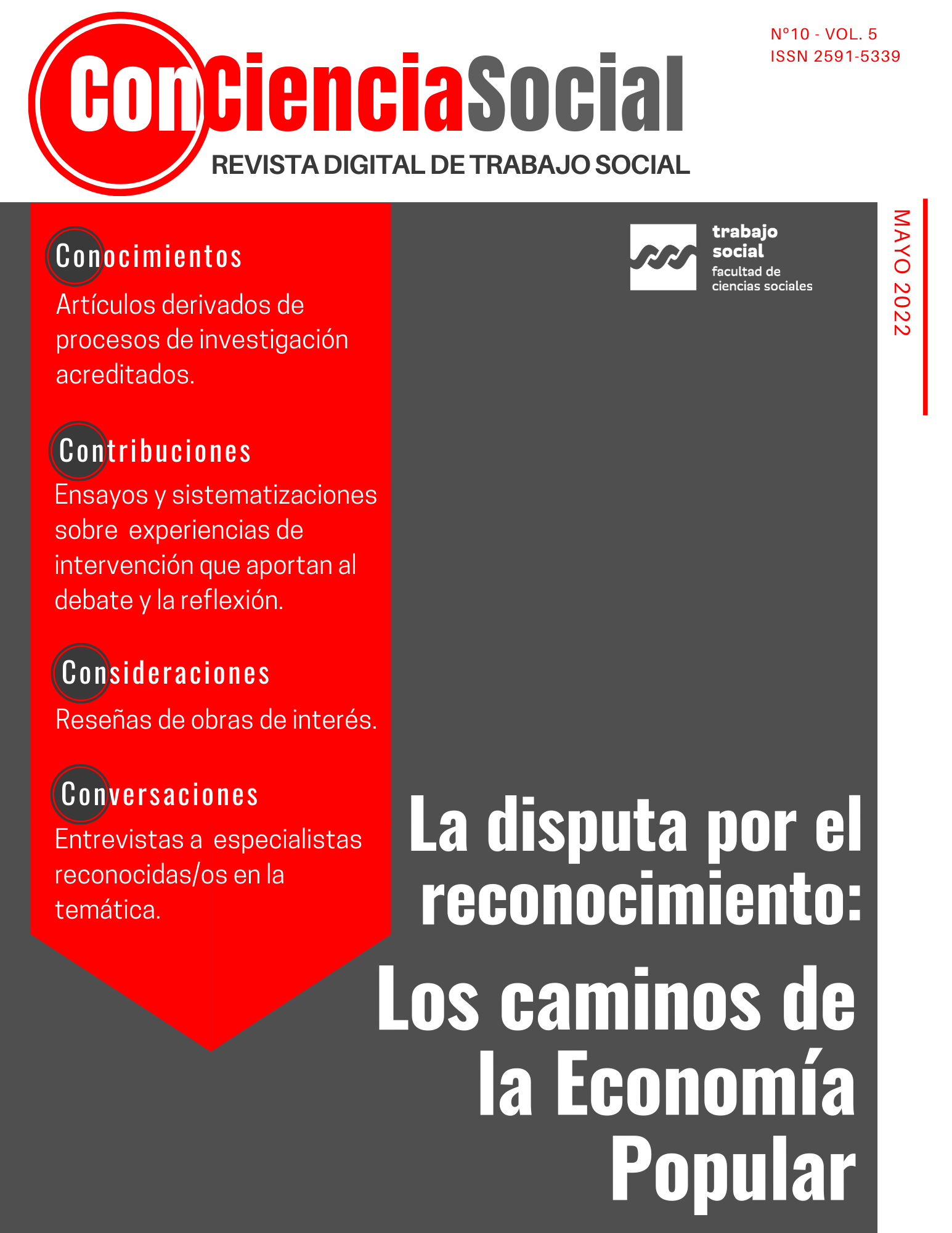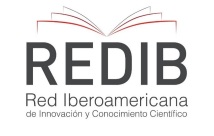Editorial
Palabras clave:
editorial, economia popular, conciencia social, numero 10Resumen
Este número de la Revista nos encuentra en medio de profundos cambios y celebraciones.
Cumplimos cinco años desde que el equipo de la entonces Escuela de Trabajo Social (UNC) y el tenaz empeño de quién asumía la Dirección de la Revista −Nora Aquín− definían la reedición de la Conciencia Social, esta vez en formato digital. Hace cinco años que, junto a Nora, el Consejo Académico y el Equipo Editorial se constituían bajo el deseo y compromiso de reabrir un espacio donde se promovieran discusiones, debates y nuevas preguntas en el campo de las Ciencias Sociales y el Trabajo Social.
Hoy, celebramos entonces un nuevo ciclo de cinco años y diez números de la Revista Conciencia Social, en la que nos invitamos –a través de convocatorias temáticas– a abordar algunas de aquellas cuestiones que interpelan las intervenciones profesionales, que desafían las preguntas de nuestras investigaciones y que tensionan las reflexiones sobre nuestras prácticas. Son cinco años y diez números en los que nos atrevimos a poner en palabras aquello sobre lo que cotidianamente trabajamos, pensamos, discutimos y construimos.
Esta celebración nos encuentra también transitando profundos cambios. Nuestra querida Nora Aquín decidió que era tiempo de delegar la tarea de Dirección de la Revista, compartiéndonos el enorme desafío de continuar este proyecto que fue germinando desde el impulso que ella le imprimió en estos años.
Al mismo tiempo, junto al crecimiento de nuestra Facultad, la Revista se ha incorporado al Instituto de Política, Sociedad e Intervención Social (IPSIS-FCS) que hoy nos alberga y pone en diálogo con una innumerable cantidad de proyectos de investigación, extensión y formación de posgrado. Esta doble inscripción– ser carrera de Trabajo Social y ser IPSIS- enriquece las voces y miradas con las que se construye la agenda de la Revista, nos vincula con otro conjunto de actores institucionales y seguramente nos permitirá potenciar la apuesta de cualificar y visibilizar las producciones de quienes hacemos Trabajo Social y Ciencias Sociales.
Las disputas por el reconocimiento…
El tema de convocatoria de este décimo número nace hacia mediados del año 2021, impregnado por las remembranzas de aquellas gestas que, 20 años atrás, ponían en escena las urgencias de las necesidades cotidianas no resueltas, la organización popular como resistencia y re-existencia, los derechos disputados en ollas populares y las calles como espacios reconocimiento y construcción de poder.
Recordábamos que nuestro país –durante aquellos años anteriores y posteriores a la crisis del 2001– fue escenario de un sinnúmero de experiencias de otras economías; generándose en algunos casos, procesos colectivos que hoy persisten y se fortalecen en las organizaciones de la Economía Popular.
Es particularmente en contextos de crisis –como los que hoy nos atraviesan– en los que las experiencias de estas otras economías se reinstalan en los espacios territoriales, en las agendas públicas y en las vidas cotidianas de grandes sectores de la población. Experiencias que tensionan a la vez que articulan el desafío de constituirse en estrategias de generación de ingresos; al tiempo que cuestionan y resisten al modo hegemónico de producción y acumulación capitalista. Fue desde estas remembranzas que convocamos a presentar artículos que dieran voz y visibilidad a los múltiples caminos que vienen construyendo las organizaciones de la Economía Popular en un contexto en el que se hace imprescindible la disputa por formas otras de producir, consumir y distribuir.
Este décimo número reúne un conjunto de artículos que desde diversas perspectivas y puertas de entrada aportan a la conceptualización, sistematización y reflexión sobre experiencias situadas de economía popular en nuestro país; reconstruyendo los procesos organizativos, los actores y sus relaciones, las disputas por el poder y los tensos y necesarios vínculos con la política estatal.
Asimismo, en la Reseña se invita a un apasionante recorrido por la(s) noción(es) de trabajo desde sus múltiples acepciones, subjetividades, historicidades y configuraciones; poniendo acento en las complejidades con las que estos trabajos configuran el cotidiano, hacen vida y sociedad en los tiempos contemporáneos.
Finalmente, la Entrevista nos regala –en primera persona– reflexiones hechas cuerpo a partir de la voz de un integrante de una organización social, productiva y política del oeste de la provincia de Tucumán, Argentina. En el diálogo, en la pregunta, respuesta y repregunta se entretejen un conjunto de afirmaciones, desafíos y saberes gestados de esas cotidianas formas de trabajos y economías que las organizaciones construyen, sostienen y recrean.
A 20 años de aquella crisis del 2001, la coyuntura actual nos reencuentra con estas experiencias de economías, de producción, de otros modos de trabajo y reproducción de la vida; experiencias de colectivos organizados que disputan por su reconocimiento como trabajadorxs, como productorxs y también como actores de la política. Al decir de Nancy Fraser[1], “la «lucha por el reconocimiento» se está convirtiendo rápidamente en la forma paradigmática del conflicto político a finales del siglo XX”. Es en estas arenas y corriendo los márgenes que las organizaciones de la Economía Popular irrumpen en escena para constituirse como actores ineludibles en las disputas sobre el mundo que queremos ser.
[1] Fraser, Nancy (1995) ¿De la redistribución al reconocimiento? Dilemas de la justicia en la era «postsocialista». Artículo es una versión revisada de una conferencia pronunciada en la Universidad de Michigan en marzo de 1995.
Referencias
Fraser, Nancy (1995) ¿De la redistribución al reconocimiento? Dilemas de la justicia en la era «postsocialista». Artículo es una versión revisada de una conferencia pronunciada en la Universidad de Michigan en marzo de 1995.
Descargas
Publicado
Número
Sección
Licencia
Derechos de autor 2022 Natalia Becerra

Esta obra está bajo una licencia internacional Creative Commons Atribución-CompartirIgual 4.0.
Aquellos autores/as que tengan publicaciones con esta revista, aceptan los términos siguientes:Los autores/as conservarán sus derechos de autor y garantizarán a la revista el derecho de primera publicación de su obra, el cuál estará simultáneamente sujeto a la Licencia de reconocimiento de Creative Commons que permite a terceros:
Compartir — copiar y redistribuir el material en cualquier medio o formato
Adaptar — remezclar, transformar y construir a partir del material para cualquier propósito, incluso comercialmente.
La licenciante no puede revocar estas libertades en tanto usted siga los términos de la licencia.Los autores/as podrán adoptar otros acuerdos de licencia no exclusiva de distribución de la versión de la obra publicada (p. ej.: depositarla en un archivo telemático institucional o publicarla en un volumen monográfico) siempre que se indique la publicación inicial en esta revista.
- Se permite y recomienda a los autores/as difundir su obra a través de Internet (p. ej.: en archivos telemáticos institucionales o en su página web) después del proceso de publicación, lo cual puede producir intercambios interesantes y aumentar las citas de la obra publicada. (Véase El efecto del acceso abierto).
Los derechos de explotación comercial (Copyrigth) quedan reservados para los autores.














